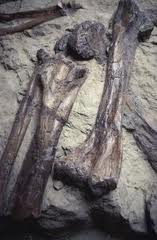 One word in the original language of the Bible can change our whole paradigm. As an example (and I can post more examples at a later date), consider one word in Genesis 1:2—was. And the earth was waste and void; this is how it reads in a number of different translations. Are you one of those Christians who believes that the earth is only 6,000 years old, and that the dinosaurs were on board Noah’s ark? Don’t feel bad if you are; perhaps 40% of adults in the United States believe as you do. But what if one word was wrongly translated in Genesis? And the earth became waste and void. In fact this one word must be translated as became according to the original Hebrew language and according to the entire revelation in the rest of the Bible. Just a few verses later (2:7) the same word is translated as became—“and man became a living soul.” Isaiah 45:18 says in particular that God did not create the earth waste and void. Yet, when we make this one little correction, suddenly there is room in the Bible and in our thinking for the earth to be much, much older than 6,000 years! God created (Genesis 1:1); it was perfect so that the angels shouted for joy (Job 38:4-7); it was not waste and void (Isaiah 45:18). But then it became waste and void: probably Lucifer’s rebellion damaged the creation issuing in God’s judgment upon it and it subsequently becoming waste and void. How much time elapsed between Genesis 1:1 and 1:2?—no one knows, but perhaps billions of years. G. H. Pember expounded on this possibility well over 100 years ago in his book Earth’s Earliest Ages. When we make this one little correction, we no longer have to try to defend a position which is contrary to the bulk of scientific evidence which says that the earth is about 4.5 billion years old.
One word in the original language of the Bible can change our whole paradigm. As an example (and I can post more examples at a later date), consider one word in Genesis 1:2—was. And the earth was waste and void; this is how it reads in a number of different translations. Are you one of those Christians who believes that the earth is only 6,000 years old, and that the dinosaurs were on board Noah’s ark? Don’t feel bad if you are; perhaps 40% of adults in the United States believe as you do. But what if one word was wrongly translated in Genesis? And the earth became waste and void. In fact this one word must be translated as became according to the original Hebrew language and according to the entire revelation in the rest of the Bible. Just a few verses later (2:7) the same word is translated as became—“and man became a living soul.” Isaiah 45:18 says in particular that God did not create the earth waste and void. Yet, when we make this one little correction, suddenly there is room in the Bible and in our thinking for the earth to be much, much older than 6,000 years! God created (Genesis 1:1); it was perfect so that the angels shouted for joy (Job 38:4-7); it was not waste and void (Isaiah 45:18). But then it became waste and void: probably Lucifer’s rebellion damaged the creation issuing in God’s judgment upon it and it subsequently becoming waste and void. How much time elapsed between Genesis 1:1 and 1:2?—no one knows, but perhaps billions of years. G. H. Pember expounded on this possibility well over 100 years ago in his book Earth’s Earliest Ages. When we make this one little correction, we no longer have to try to defend a position which is contrary to the bulk of scientific evidence which says that the earth is about 4.5 billion years old.
became
03 Tuesday Jan 2012
Posted in Bible study
